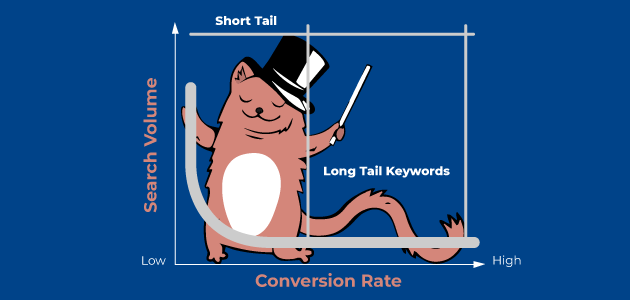Simple Tricks To Find the Perfect Long Tail Keyword For Your Blog

Have you ever wondered why people visit your website? Why do they choose exactly your website among the thousands of others that are just as relevant?

If you've read our article about Google Analytics and Google Search Console, you will have a bit more clarity on that, but to recap it - it's magic. Not in the pulling a rabbit out of a hat sense, but more like on digital.
Unlike other magicians who don’t reveal their secret, this magician will explain everything to you. It is pretty simple, nothing extraordinary behind it - only a lot of effort and skill.
The trick here is called long tail keywords and is what drives all your audience from search engines to your website.
Yes, there are single-word keywords and short tail keyphrases, but by far, the best resource you should aim at is the long tail keywords.
What Are Long Tail Keywords?
There are three types of keywords. Single word phrases are just one word. They are usually very competitive and tough to rank. For example, if you sell winter tires for bikes with 7.5-inch rubber knobs. By targeting the single word phrase "bikes” or "tires", you will have to compete with thousands of other businesses, many of which don't even sell tires. Adding one or two more words into your meta-data (for example, "winter bike tires'') will make your keyword phrase the second type - a short tail keyword. Still, you will have to compete with millions of others who rank for the same short tail keyword. Finally, there are the long tail keywords. A longtail keyword is essentially the sentence with which people will describe your product most often. For example, " Winter bike tires with 7.5-inch rubber knobs". As you'd probably guess, this keyphrase will be with much lower search volume but extremely uncompetitive as well. Basically, anyone searching for this will find you.

Long Tail keywords are specific queries that only a few will search, but they will look precisely for your product or service.
Why Long Tail Keywords Are The Best
Longtail Keywords are a dream come true for any SEO specialist. They are low competitive and easy to rank, which brings around all its benefits with that Why should Google Be Your Best Friend?.
About 96% of all searches in Google are with more than four words. It means that almost everyone searches for something more specific, which is hardly surprising.
People tend to dislike wasting their valuable time on the internet and they are actually searching for specific items. If you are looking for a winter hat for skiing, you won't just write “hat” in the search bar. You will type the whole thing. It's far less time consuming to type 2-3 words than going through thousands of websites that don't offer what you seek.

Furthermore, the longer the keyword is, the better the conversion rate. If a customer writes for a specific item, they have likely already done their research and are willing to buy it.
Long Tail keywords allow you to rank better, avoid needless competition with other businesses offering completely different items and have a much better conversion rate.
Google Search As A Keyword Farm
Nowadays, it's really not that hard to come up with hundreds if not thousands of longtail keyword ideas. There are literally dozens of resources to use. However, probably the best ones you can turn to are precisely those you need to impress, namely Google.
Google search has many options to steal ideas from if you are clever enough to notice them. Probably the easiest way to determine relevant keywords for your area is by simply typing your primary keyword. If we go back to the bike tires, you may write "Bike tires" in the search bar, and ten suggestions will appear from thin air. These are the things your local audience has searched for recently, so you might want to take a deeper look into them.
There are, of course, some weird suggestions from time to time, but you can always laugh them off and continue your serious work afterwards.

The related searches on the bottom of the first page are another goldmine for long tail keywords. You can even make a proper chain out of it if you take one of the search-related suggestions and place it in the search bar. Then, eight new long tail keywords will appear on the bottom.
Do this for each suggestion as long as they make sense to your business, and your long tail keywords list will expand exponentially.
The third primary goldmine for long tail keywords is the "people also ask" box. There, you will get some very relevant questions you initially might not have thought of.
Those are genuine questions people were interested in regarding the word, and making an article addressing those queries will boost your SEO immensely.
For example, in our region, if you write "bike tires'' in the search console, the first "People also ask" suggestion is "How much does it cost to replace tires on a bike?" That's a perfect topic for a website selling bike tires since it's evident that the local community is interested in tires and their price.
You can easily find thousands of potential long tail keywords with minimum effort using these cheats. However, keep in mind that they will be accurate if you target your local community. If you are spreading wider, you will need some additional help.
Using Google Tools As A Brainstorming Help
As we have mentioned previously in our articles, we love Google, and that's mainly because they have some amazing tools that make our job so much easier.
When it comes to long Tail keywords, they are not the ones to disappoint. With Google Analytics, you can find out so much about your customers as a whole {link to Google Analytics vs GSC article}, but also get a ton of longtail keyword ideas.
You will find keywords that people have used to land on your website, making them invaluable since they already send you leads. However, you'd want to invest some time and effort into ranking higher on them, since most likely, if you are not specifically targeting them, your website is probably on page 2 or even worse. To check your own keywords, go to Traffic Source ->Source -> Search -> Organic.

The search query report is one of your most important sources of information about keywords if you are running a PPC campaign in AdWords. They again show you what people wrote in their search bars to get to your website. However, they don't show you the organic results but rather the paid ads. As a plus, you will get more information, the most essential aspect of which is the information which longtail keyword is bringing you the most conversions.
From time to time, you've done it great all along, and you are actually ranking the best keywords by a fluke. There are instances when you have a page ranking a particular keyword without even optimizing it for the keyphrase. However, there is no chance of being ranked Number 1 by chance, so you'd best put some effort into these keywords to make it big. Google Search Console will show you all of these keywords that put your content on pages 2,3,4 on Google.
However, before you go all-in on a longtail keyword, it's best to check if it's worth your time in Google Keyword Planner and Google Trends. The former shows you the search volume of the set keyword, while the latter will allow you to see how it trended during the last few months.
This way, if a word is highly competitive and the trend of searches is going downwards, it's best not to waste time and effort with it.
Use Dedicated Keyword Finding Tools
Using only Google for your long tail keywords planning is quite limiting, though. So you might want to mixing it up with some fresh, free, and widely used tools should not be out of the question.
When brainstorming long tail keywords, it's a great idea to use several keyword finding tools. One of our favorites is Keywords Everywhere. It's a paid extension for your browser. However, its prices are mostly symbolic. For $10, you can check 100,000 words. Not a bad deal at all. The tool will tell you every little detail about the words you write in Google's search bar as well as their search volume of the last few months, the competition level and the CPC. It will also give you a bunch of relevant suggestions.
Ubersuggest is pretty much the same, and it even works great in tandem with Keywords Everywhere. The Neil Patel tool will give you valuable information and will generate dozens of long tail keywords, giving you the same info about them as will Keywords everywhere.
If you are looking for a free tool, though, probably your best bet would be Soovle. It works with Google just as well as it does with Amazon, Wikipedia, Ask.com, YouTube and many other platforms.
This brings on the table one immensely colossal advantage. By screening all these websites, it may uncover a very niche and unknown to others relevant keyword that has little to no competition, although it has excellent volume. True, these instances are a needle in a haystack, but hey, there is a chance.

Finally, there is Answer the Public. This tool is outstanding when you need to come up with a content idea. All you need to do is type a broad keyword (for example, "bike tires"), and you will get dozens of question-focused longtail keywords. The best part is that the questions are based on what the public has actually asked in the search engines search bars.
When it comes to finding great content topics, though, there is no better place than the Q&A websites.
Use Q&A Websites As An Inspiration
Q&A websites are a goldmine for long tail keywords and content topics alike. These are places where people with a genuine interest in a certain keyword ask relevant questions. Yahoo Answers is probably one of the most renowned such websites. Although many of the questions are truly mind-altering stupid, you can easily find more than a few queries worth writing down.
Quora is another such website where, fortunately, the community has much better knowledge and answering culture.
Typically the best answers have quotes and references, which allows you to see not only if the keyword you are getting is relevant but also see if your competition is already building content around it. If you offer products, it's a good idea to check Askville. The Q&A website is powered by Amazon and can pretty much tell you what your potential customers are worried about.

On the other hand, LinkedIn Answers is the go-to place for services and B2B queries.
All of the websites mentioned above are one fantastic pool of keywords you may use to better your SEO score, and even better, write some content on topics that someone literally asked for. However, your research should not be limited to these Q&A websites.
Steal Ideas From Forums And Other Websites
The internet is full of various websites full of ideas. A good idea is to check out what your competition is doing. If they recently posted on a topic, it might be worth creating something with the same topic and keywords, only with higher quality, better readability and extended information.

Visiting forums or social media groups dedicated to your products, brand, and services is another excellent idea to check for long tail keywords. Reddit and Wikipedia are also viable options. You can find keywords everywhere your product is being mentioned.
How To Use Long Tail Keywords
The best way to use your keywords is by creating some valuable content pointing to this exact keyword. Google often changes its recommendations on how you should write a blog post that will rank better.
Generally speaking , you need to mention the keyword often, at least once in your first paragraph, sub-headings and preferably in your heading.
The downside of that is you’ll need to pump constant content or at least screen your keywords fanatically to find the best ones. The low search volume of these keywords makes the efforts into creating content not worth your while.

On the other hand, if you just put them wherever they fit, they will attract attention. So you needed to optimize for them specifically. Only add them to your content, and they will rank. This way, even if a keyword has 100 visits per month, it's a plus if you manage to get them all or at least a fraction. Make this with 100 long tail keywords, and with a minimum effort, you will increase your reach substantially.
Let's Recap
If you want to have free organic traffic to your website, you would need to make Google put you on its front page for specific words. These keywords can be single word phrases, short tail keywords and long tail keywords.
Using long Tail keywords is a wonderful idea since about 96% of all searches in Google are longtail. Although they have lower search volume, they also have lower competition, and much better ranking opportunities with only little effort to be ranked and bring 2.5 times more conversions.
Finding long Tail keywords is relatively easy if you know where to look.
To properly use these keywords, you don't need to make content for each and every one of them. All you need to do is sprinkle them wherever they fit.
All this information may sound a bit overwhelming, and that's completely natural if you haven't done keyword research before. That's why it's a good idea to leave this to the professionals. Hiring Locus Digital to find the best long tail keywords for your business and optimize your website to include them will save you time and effort.


